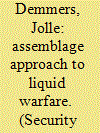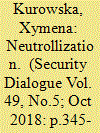|
|
|
Sort Order |
|
|
|
Items / Page
|
|
|
|
|
|
|
| Srl | Item |
| 1 |
ID:
161493


|
|
|
|
|
| Summary/Abstract |
The Western state-led turn to remote forms of military intervention as recently deployed in the Middle East and across Africa is often explained as resulting from risk aversion (avoidance of ground combat), materiality (‘the force of matter’) or the adoption of a networked operational logic by major military powers, mimicking the ‘hit-and-run’ tactics of their enemies. Although recognizing the mobilizing capacities of these phenomena, we argue that the new military interventionism is prompted by a more fundamental transformation, grounded in the spatial and temporal reconfiguration of war. We see a resort to ‘liquid warfare’ as a form of military interventionism that shuns direct control of territory and populations and its cumbersome order-building and order-maintaining responsibilities, focusing instead on ‘shaping’ the international security environment through remote technology, flexible operations and military-to-military partnerships. We draw upon assemblage as a heuristic device and the case of the US Africa Command (AFRICOM) to flesh out the complex and fluid nature of liquid warfare and the ways by which power operates across space. We outline how the forging of a transnational military assemblage in the name of ‘hunting Kony’ allowed for the buildup of an archipelago of military bases and operational capabilities across Africa, which serve as hubs for the monitoring, disrupting and containment of potential risks and dangers.
|
|
|
|
|
|
|
|
|
|
|
|
|
|
|
|
| 2 |
ID:
161492


|
|
|
|
|
| Summary/Abstract |
This article considers the significance of trolling for security processes through a contextual analysis of industrialized pro-Kremlin trolling in the Russian blogosphere. The publicity surrounding Russia’s hacking activities in international politics conceals the significance of the domestic trolling culture in Russia and its role in the ‘trolling turn’ in Russia’s foreign policy. We contextually identify the practice of ‘neutrollization’ – a type of localized desecuritization where the regime adopts trolling to prevent being cast as a societal security threat by civil society. Neutrollization relies on counterfeit internet activism, ostensibly originating from the citizenry, that produces political disengagement by breeding radical doubt in a manner that is non-securitizing. Rather than advocating a distinct political agenda, and in contrast to conventional understandings of the operations of propaganda, neutrollization precludes the very possibility of meaning, obviating the need to block the internet in an openly authoritarian manner. It operates by preventing perlocution – that is, the social consequences of the security speech act. This prevention is achieved through the breaking or disrupting of the context in which acts of securitization could possibly materialize, and is made possible by a condition of ‘politics without telos’ that is different from the varieties of depoliticization more familiar in Western societies.
|
|
|
|
|
|
|
|
|
|
|
|
|
|
|
|
| 3 |
ID:
161494


|
|
|
|
|
| Summary/Abstract |
This article looks at how asylum examiners in Brazil account for their ability to identify asylum applications they see as clearly abusive. The argument highlights a proclivity in examiners’ talk to shift discursive registers, from law and evidence to psychological and social bias, when talking about identifications they agree and do not agree with. This way of talking, it is argued, allows examiners to treat the refusal of clearly abusive claims as self-explanatory, while also acknowledging discretion as an inescapable feature of asylum decision-making. By relying on this ambiguous style of speaking truth, which portrays the outcome of claims as both dependent on and free of discretion, Brazilian examiners accrue authority to their views. Decisions to deny clearly abusive claims are rendered reasonable, in spite of barely being accounted for. What is worse, register-shifting kills the drive to ask what makes these denials so obvious by making the very question sound absurd.
|
|
|
|
|
|
|
|
|
|
|
|
|
|
|
|
| 4 |
ID:
161495


|
|
|
|
|
| Summary/Abstract |
A succession of media scandals and policy arguments in the UK in recent years has been integral to the construction of a so-called ‘Muslim Problem’. Media and political attention paid to Muslims in British public life, across a vast and varied range of issues, suggests a social preoccupation that exceeds the security framing the ‘War on Terror’ once imposed. In this article, we develop and apply Slavoj Žižek’s Lacanian theory of ideology to produce an original conceptual and analytic framework centred on the social functions served by, as well as the co-constitution of, anxiety and fantasy. We then apply this framework to explore three scandals relating to child sexual exploitation, halal meat and education. We show that the representations of British Muslims that these scandals entail are best understood as ideological fantasies, mobilized to suture traumatic gaps and conceal contradictions in wider social practices around such issues. We argue that the unrelenting media and political focus on myriad aspects of British Muslims’ imagined lives is symptomatic of what Žižek calls an ‘unbearable anxiety’: Islamophobic ideological fantasies conjure a ‘conceptual Muslim’ to sidestep confrontation with the Lacanian ‘Real’ – antagonistic and anxiety-inducing structures and practices underpinning British society, of which we do not speak.
|
|
|
|
|
|
|
|
|
|
|
|
|
|
|
|
|
|
|
|
|